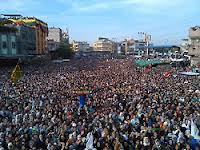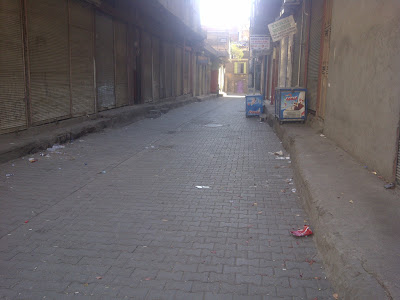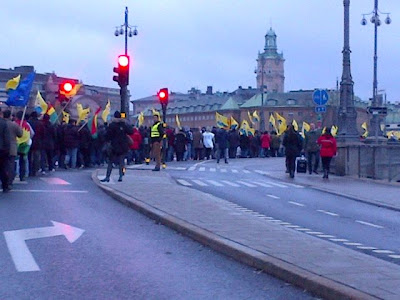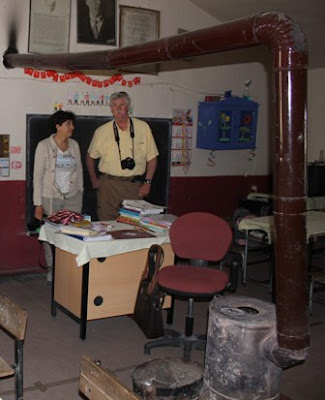On Sept 10, 2012, a mass trial for 44 Kurdish journalists began. Most are charged with "membership in an armed organisation," which is punishable by up to 15 years in prison, according to the Anatolia news agency. The organisation is not the PKK, it is the Union of Kurdistan Communities (KCK), a Kurdish political party that the government accuses of aiding the PKK. The stated goal to “annihilate the PKK” and destroy the KCK might, by some people, not represent actions of a “moderate leader” as Ceylan Yeginsu describes Erdogan in the International Business Times, Nov. 15. Erdogan scorns hundreds of hunger strikers who are risking death for the cause of Kurdish rights.
Some observe, with sarcasm, that the fact there is a trial at all for the journalists is a step in the right direction. "It is better than the past," says Huseyin Akyol, editor of the pro-Kurdish newspaper Ozgur Gundem, eight of whose staff are on trial. Mr. Akyol, a 23-year veteran of the paper, offers a stark perspective. "In the 90s the state killed us, we lost 76 journalists and distributors and they blew up our offices. Now they just imprison us - although life in prison is difficult."
Turkey currently tops the world for jailed reporters according to a report published in October 2012 by the US-based Committee to Protect Journalists. It found 76 journalists were imprisoned as of 1 August, 2012, of which 61 were identified as being detained because of their reporting.
Prior to the elections of June 2011, 13 Kurdish candidates for parliament (mostly BDP) were banned from running for office which led to massive protests forcing the government to restore 12 names to the ballot. From the Kurdish point of view, this is what caused the escalation of violence resulting in over 800 deaths of both soldiers and Kurds since then.
 |
| Kurdish mayors, politicians, and journalists arrested in Turkey |
Over 33 elected mayors of eastern Turkey’s Kurdish towns and cities had been arrested as of April 2012. That number continues to grow. On June 7, 2012, the mayor of Van was arrested along with 4 other mayors. In Dogubeyazit on June 14, 2012, 15 Kurds were arrested without charges and taken to Agri jail. Many were employees in the local city hall and a few worked in the local BDP office. The mood of the town grew sullen. People were depressed and angry. These alarming scenes of arrests throughout eastern Turkey have been escalating since 2009 when Erdogan began his campaign to destroy the KCK. The arrests have left Kurds in a growing sense of outrage.
7748 people have been imprisoned and over 3800 people have been arrested during operations against the KCK. Many elected officials and politicians arrested are members of BDP, not KCK. Many people, including children, remain in prison without being charged.
The press rarely reports about the US drones that fly over eastern Turkey 24/7 and report locations of suspected PKK camps to the Turkish military, nor does it report on the hundreds of innocent Kurds that have been killed by bombing raids called out by the drones. I spoke in person to a Turkish Air Force helicopter pilot in May 2011 who told me he was trained in Atlanta, Georgia, to fly the helicopters. He explained that the US passes drone information to the Turkish military for action.
U.S. drone flights in support of Turkey date from November 2007, when the Bush administration set up what is called a Combined Intelligence Fusion Cell in Ankara. U.S. and Turkish officers sit side by side in the dimly lighted complex monitoring real-time video feeds from Predator drones.
Right after a 7.2 magnitude earthquake hit Ercis and Van on Oct 23, 2011, displacing nearly one million residents, instead of sending aid to the area, the military sent 10,000 soldiers into southeastern Turkey in a military campaign against the PKK and flew bombing raids resulting in more deaths. When international aid agencies offered earthquake aid to Turkey, the government turned down the aid, leaving bewildered observers and survivors asking, “Why?”
In Dec 15, 2011, US Secretary of Defense Leon Panetta met in Ankara with President Abdullah Gul and Turkish defense leaders to finalize a 111 million dollar deal for the U.S. to move its drones from Iraq into Turkey and to sell 3 AH1 Super Cobra helicopters to Turkey. Panetta expressed the United States’ solidarity in its fight against the PKK. It appears the US wants the PKK finished off so it can stage its continuing Middle East wars from Turkish soil without interference.
On December 28, 2011, 36 innocent Kurdish young men with their mules were bombed and killed on a Qandil mountain trail between Iraq and Turkey. The Turkish government blamed the “mistake” on “bad intelligence”. The U.S. predator drone flew away after reporting the caravan's movements, leaving the Turkish military to decide whether to attack, according to an internal assessment by the U.S. Defense Department, described to The Wall Street Journal. "The Turks made the call," a senior U.S. defense official said.
 |
| Uludere bombing, based on US drone intelligence, killed 36 innocent Kurds |
The message was clear. The Qandil mountain trails between Iraq and Turkey should be closed now that the U.S. was transferring its drones to Turkey. In May 2012, NATO and the US established its radar base for the missile defense system in Malatya in southeast Turkey, with little or no international press coverage, in spite of regular protests outside the gate of the military base. In exchange for US drone coverage, as well as US drone and helicopter sales to Turkey, in support of Turkey’s campaign to annihilate the PKK, Turkey allows the US to maintain military bases on Turkish soil.
The 3 AH1 Super Cobra helicopters were delivered by the US to Turkey on September 23, 2012, two weeks after the prisoner hunger strike for Kurdish rights began.
The AH1 Super Cobra is armed with Hellfire missiles. The Obama administration formally notified the US Congress on Oct. 28 of an unusual proposal to sell three AH-1W Super Cobra twin-engine attack helicopters to Turkey from the US Marine Corps inventory. Under the administration's plan, the Marines would get two new, late-model Textron Inc Bell AH-1Z Super Cobras in exchange for the three, twin-engine AH-1W aircraft that would be transferred to Ankara, a congressional official told Reuters last year. Such sales from the US military's current inventory are extremely rare, Reuters noted.
One must ask how many schools could have been built for Kurdish school children for the price of those 3 Super Cobras?
According to a letter from the hunger strikers, they are asking for more humane conditions for Abdullah Ocalan, held in solitary confinement for a year-and-a-half. His attorneys have not been allowed to visit him. A website (http://www.hezenparastin.com/eng), which is blocked in Turkey, contains a letter from Ocalan describing his deteriorating physical condition. He explains that has body trembles from lack of sufficient air in his tiny cell. He feels he is suffocating. I ask, what country in the world, abiding by international legal standards, justifies denying a prisoner the right to meet with his attorney (other than, of course, the United States at Guantanamo gulag)?
Why is the demand by the hunger strikers for Kurdish rights and easing of prison conditions for Ocalan and the right to meet with his family and lawyers so difficult to agree to? On what principal is the Turkish government standing firm in its position against the hunger strike?
Amy L. Beam, Ed.D.
educator and tour operator
amybeam@yahoo.com
http://www.mountararattrek.com
http://climbingmountararat.blogspot.com


































